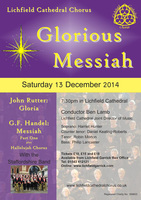Glorious Messiah ()
A concert with 2 choral treats: Handel Messiah (Part 1) and Rutter Gloria with the Staffordshire Band
We sang:
- Messiah, HWV 56 (1742) — Handel
- Gloria (1974) — Rutter
Venue
Lichfield Cathedral, The Close, Lichfield, WS13 7LD [map]
« Fauré: Requiem, Williams: Tsunami Requiem (Jun 2014) ‖ Carol Concert (Dec 2014) »
Reviews
Handel’s Messiah gets the Christmas musical juices flowing
But first we were treated to some fine playing by the band, displaying their great dynamic range in “Troika”, and a beautiful resonance in “Who is He?”, warming us and themselves up before launching with verve into John Rutter’s youthful “Gloria”, which was written for an American choir in 1974. The Latin American rhythms of this work give a brilliance and energy which the choir, under Ben Lamb’s baton, captured well, although there was a feeling that the singers were battling somewhat with the power of the band in this difficult acoustic. The most successful part of the performance was the second movement, where Rutter’s skilful orchestration allowed the vibrant brass to be contrasted with some beautiful quiet and sustained singing in the choir. The tricky fugal passage of the final movement was well handled, the good tenor lead simply lacking a little in confidence.
After the interval we came to the meat of the evening, Handel’s ever-popular Messiah, which produced some amazing moments. It takes some skill to play the light, crisp baroque lines on brass instruments, and there were places where this was managed well, particularly by the upper instruments, but in many parts the resonance of the brass made it difficult to hear the excellent singing by the choir. The splendid tenor soloist, Robin Morton, made a truly valiant effort in his somewhat understated opening recitative and aria. He displayed excellent diction, with an even tone throughout his vocal range and sensitive ornamentations, but was struggling to be heard against the brass, at least from where I was sitting. However, he sang with conviction and with a little more experience under his belt will certainly be one to watch in future. The other soloists were treated to the fine organ continuo and accompaniment of Martyn Rawles, who supported the lovely clear-toned soprano Sophie Gallagher particularly sensitively. Sophie, a former head-chorister from Salisbury Cathedral, took on the role at very short notice, and brought a youthful crispness and clarity to her angelic part, establishing excellent communication with the audience. Bass Philip Lancaster similarly involved us totally in his dramatic lines, and although the lowest notes were slightly underpowered the overall effect was of confidence and enthusiasm. There may have been a little too much enthusiasm from the counter-tenor Daniel Keating-Roberts, who gave us a very romantic approach with considerable scooping up to many notes, a habit which somewhat broke the flowing lines, and some rather over-egged ornamentations in places. However, his voice had a purity of tone which carried well to the furthest reaches of the packed cathedral.
And what of the choir? Familiarity did not breed contempt; indeed, there were some delightful passages, such as the dance-like “And the glory”, and a good steady “For unto us”. Some of the runs could have done with more definition in this acoustic, and we could certainly hear more detail in those choruses such as “His yoke is easy” which were accompanied by the organ, but the final Hallelujah Chorus was predictably a brilliant and exciting ending, capped by a magnificent ultra-high final note on the cornet… a moment of which Handel would have undoubtedly approved had he thought to write this work for brass!
Megan Barr, February 2015
